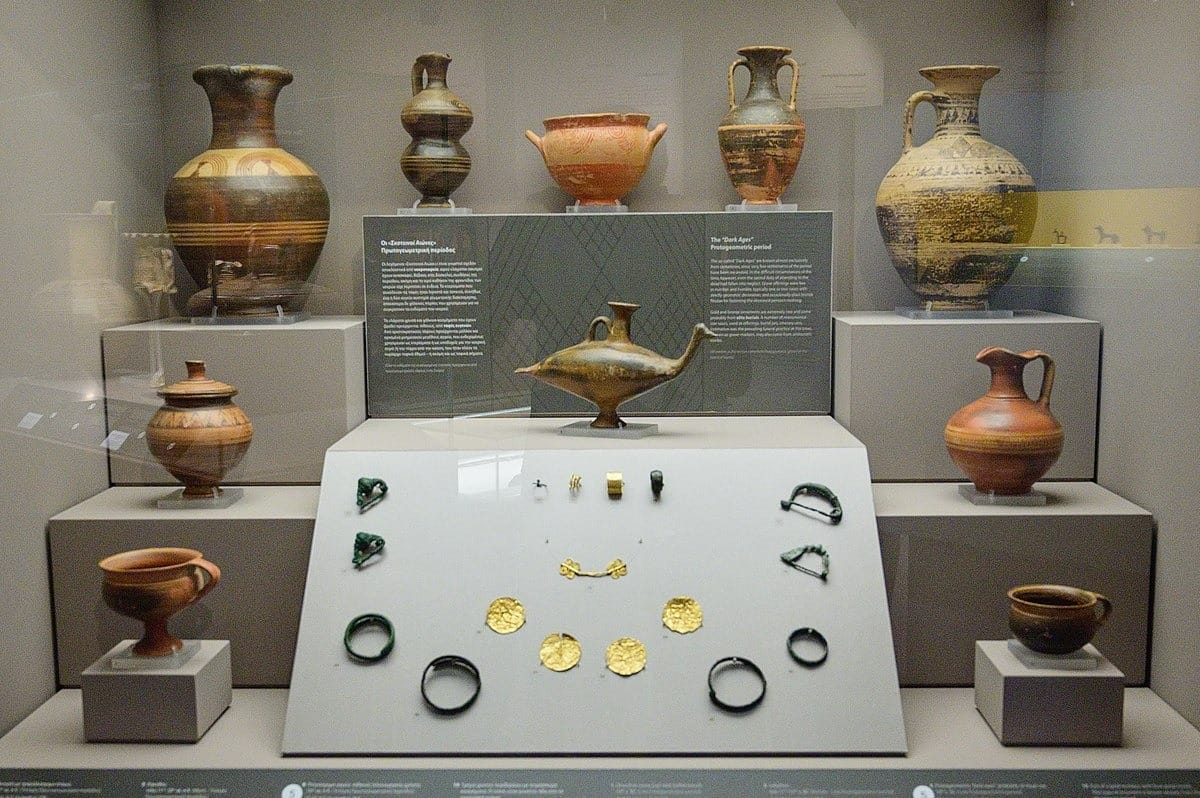

The famous Bronze Age Collapse at the end of the Mycenaean Era led directly into the Greek Dark Ages. This societal collapse happened around 1200 BCE, and the Dark Ages ended around the year 750 BCE—at least, that is the traditional scenario promoted by most scholars today. However, there are some scholars who argue for quite a different scenario. They claim the Mycenaean Era led directly into the Archaic Era, with no Greek Dark Ages at all. What does the evidence really show?
According to the generally accepted history of ancient Greece, the Mycenaean Era lasted from approximately 1600 to 1200 BCE. In the twelfth century BCE, Greece experienced a societal collapse, along with much of the rest of the Eastern Mediterranean. Historians refer to this event as the Bronze Age Collapse.
During the subsequent period, the Greeks endured with a far smaller version of their civilization. They did not have any grand kingdoms or citadels during this period. Furthermore, their writing system, Linear B, fell out of use. Greek literacy did not return until nearly the end of the Greek Dark Ages.
In the ninth century BCE, the Greeks adopted the Phoenician alphabet. Various settlements started to be built up, with some of them entirely new, like Sparta. Eventually, by about 750 BCE, the Archaic Era had begun, and Greek civilization was flourishing again, with the Dark Ages having ended.
There are a minority of scholars who believe the Greek Dark Ages never existed at all. Instead, they believe the Mycenaean Era actually occurred several centuries later than commonly believed. There was no Bronze Age Collapse at all, according to these scholars.
Rather, the Greek civilization simply evolved gradually from the Mycenaean Era into the Archaic Era. There was no centuries-long gap of obscurity and illiteracy.
This argument is invariably tied to an argument regarding a revision in Egyptian chronology. This is because archaeologists tend to use Egyptian material to date the nearby Mediterranean nations, including the Greeks. Thus, if the Egyptian chronology is ‘corrected’ (in the opinion of these scholars), then the Greek Dark Ages simply disappear.
The arguments on both sides are very intricate and involved, so it would be impossible to present a comprehensive breakdown of the debate here. Nonetheless, there is one archaeological argument that is especially hard to counter for those who argue that the Greek Dark Ages never existed.
Recall that the traditional chronology places several centuries between the use of Linear B and the use of the later Greek alphabet. In line with this, there is no archaeological evidence at all that the two scripts were ever used together. In other civilizations, when two scripts definitely existed at the same time, we find copious evidence of this.
For example, in early medieval Britain, archaeologists have discovered many dual inscriptions in Latin and Ogham (an Irish script). The Rosetta Stone of Egypt famously demonstrates the use of multiple scripts at the same time. This is just considering multiple scripts that appear on a single artifact.
In Mycenaean Greece, not only do we not find dual inscriptions, but we also do not find any inscriptions written in the Phoenician-derived Greek alphabet from archaeological layers dated to the Mycenaean Era—nor do we find any Linear B inscriptions from archaeological layers dated to the Archaic Era.
If one era transitioned smoothly into the other, this total lack of dual inscriptions or contemporary inscriptions in both scripts would be inexplicable. In contrast, placing the Greek Dark Ages between the two eras explains this well.
Another piece of evidence not usually taken into consideration is the Egyptian tradition recorded by Plato. In the Timaeus, written around 360 BCE, he tells the story of how Solon spoke to the Egyptian priests of Sais. While this is commonly dismissed as a fictional story to introduce the account of Atlantis, the very reason that Plato introduces this account requires it to be genuine.
According to Plato, one of the Egyptian priests explained to Solon the reason why the Greeks did not know the story of Atlantis. He told Solon that the events happened long ago in a previous era of Greek dominance and literacy. However, a societal collapse occurred, which brought an end to that era.
The Greeks fell into illiteracy and continued that way for some time. Eventually, their civilization recovered, and they learned the art of writing again. This is a perfect description of the Bronze Age Collapse and the Greek Dark Ages that followed.
Therefore, the tradition recorded by Plato strongly supports the conclusion that the Greek Dark Ages really did exist.
